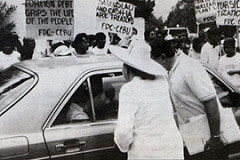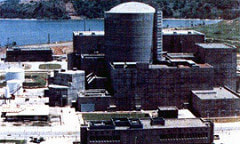THE HISTORY

The advocacy on “freedom from illegitimate debt” took shape within the atmosphere of activism nested in a dictator’s regime. At that time, the dictator, Ferdinand Marcos, employed debt in his fiscal management to finance the government’s development programs and to fatten his pockets and those of his cronies in the midst of an economy that was falling into ruin. Debts were contracted bereft of transparency. Export-oriented industrialization was never pursued for it was more practical at that given context to simply adopt the policy of a debt-driven growth.
With the dictator’s closeness to the United States of America , he was able to smoothly avail of the funds coming from the coffers of the International Financial Institutions (IFIs), i.e. International Monetary Fund (IMF) and the World Bank (WB). Such closeness became the key to grandeur and glory of a dictator and his cohorts at the expense of the people trapped in a drama of human rights violations and poverty.
Before the Batasang Pambansa (National Assembly) elections in 1984, foreign debt was determined to be the third top predicament of the country following high cost of living and unemployment. Having this picture as a backdrop, activists, then, were left with no options but to take into account the debt issue as a constitutive dimension of the struggle for a comprehensive and meaningful change.
In 1986, the dictator was ousted through a popular uprising called “Edsa Revolution.” Corazon Aquino became the President of the revolutionary government. For the advocates, it was the opportune time to lobby for the cancellation of the dictator’s debt to the international lenders community. With the international recognition of the illegitimacy of the expelled regime, debts incurred by such should have been considered illegitimate.
Unfortunately, in 18 September 1986, at the joint session of the US Congress, the pronouncement of the “honor-all-debt policy” by President Aquino was sweetly sounded within the walls of the august chamber. Consequently, Mrs. Aquino institutionalized the Presidential Decree (PD) 1177 of Marcos by integrating it into the Revised Administrative Code of 1987. PD 1177 authorized automatic appropriations for debt service detrimental to the basic social services that the government should be accountable for.

Later in 1986, the groundwork for establishing the Coalition was participated in by personalities of the progressive social movements, like Loretta Ann Rosales and Cito Santillan of Bagong Alyansang Makabayan, Randy David of Bukluran sa Ikauunlad ng Sosyalistang Isip at Gawa (BISIG), Renato Constantino Jr., and Ma. Teresa Diokno of IBON, Horacio Morales of the Volunteers for Popular Democracy (VPD). Those coming from the academe were Germilino Baustista of the Ateneo de Manila University and Manuel Montes of the University of the Philippines.
Finally, the Freedom from Debt Coalition (FDC) was established in November 1987 with the first secretariat composed of Filomeno Sta. Ana III (Secretary General), Teresita Galang and Jennifer Smith. It had its founding Congress on 12-13 March 1988 at the Asian Institute of Management (AIM), participated in by around 250 delegates. Newspaper columnist Firmo Tripon of KAAKBAY, Public Administration Prof. Leonor Briones of the University of the Philippines, and Prof. Amado Mendoza Jr. of National Economic Protectionism Association (NEPA) were elected President, Vice-President for Internal Affairs and Vice-President for External Affairs, respectively.
Amid divergent sectoral orientations and political ideologies, the Coalition was bound by two basic principles: 1) That the Filipino people have the right to know the details of the country’s foreign debt by virtue of being the ones forced to pay for it; and 2) That the Philippines have the right to adjust debt payments to the nation’s capacity to pay to ensure economic growth.
The composition of the Coalition and the changing nature of the country’s indebtedness are major factors that determine the campaigns and advocacy track of the organization.

Over the years, FDC has consistently recognized debt as the prism that holds the wide spectra of issues ranging from structural adjustment policies (SAPs) that the multinational financial institutions like the IMF, WB, Asian Development Bank (ADB), et al. were imposing on the Philippines to the power sector issues, taxation, fiscal reforms, water privatization, and the deregulation of petroleum products. These imposed neo-liberal policies have been woven into the campaigns and advocacy fabric of the coalition.
FDC’s campaigns and advocacy works have made milestones in the local, national and international landscape.
Gains in the campaigns of the local chapters include the decision of the Energy Regulatory Commission (ERC) to refund the excessive rates exacted by the Panay Electric Company from the consumers. The total amount of which reached beyond the sum of all assets the company has. In the Eastern Visayas region, a number of municipalities passed resolutions banning mining in their own respective areas. Other chapters have also their share of tangible gains from their unwavering commitment and efforts to carry out the campaigns.
In the national setting, aside from stirring up vibrant public discourse, FDC have been influential in crafting legislations ranging from the Joint Legislative-Executive Foreign Debt Council through Republic Act (RA) 6724 in 1989 to the 2008 General Appropriations Bill in which the Philippine congress stripped away P25.9 Billion from the executive’s proposal for debt servicing on account of the US dollar depreciation, the recognition of the illegitimate debts being questioned, and the premature allocation for servicing of proposed loans; and re-aligned the said amount for education and health and other essential services .

FDC exposed extensively the Bataan Nuclear Power Plant case, among others, which had emerged as a classic example of an illegitimate debt in the international community. Recognized as one of the major debt campaigners in the world, FDC played a significant role in the formation of the Jubilee South, a coalition of highly regarded debt activists among southern countries.
